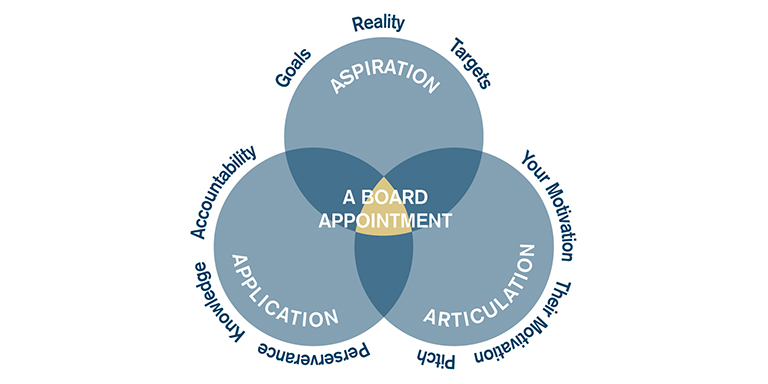Many people find the process of gaining a board appointment overwhelming and, as such, often quit before they find the role that is right for them. There are, of course, plenty of people who gain board appointments and even build board portfolios. So, what is it they know that perhaps you don’t?
What does it take to develop a Board Career?
I recently co-hosted a podcast with CPA and respected NED Janice van Reyk. In it, we discussed “what it takes to develop a board career”. Janice reflected on the advice she provides to individuals wanting their first appointment or to step up their board experience. Having helped thousands of both aspiring and successful people to become Non-Executive Directors (NEDs), her advice reflected my knowledge of what successful NEDs know that many others don’t.
1. Know your target organisations
One of the first questions Janice asks prospective NEDs who come to her for advice is, “What organisation do you want to be appointed to the board of?”. She told me that she is always astounded by how many people can not answer on the spot.
I, too, ask clients and aspiring NEDs all the time, “What sort of board role are you looking for?”. More often than not, they come back with a very general response such as, “Look, I’ve been working in the infrastructure space for decades, and so I think it’s going to be in and around infrastructure, but I am interested in not-for-profits as well. I have also been thinking about construction and social housing.” And so, they give me a whole range of different industries that they might be appointed to. But they’re unable to whittle that down to specific examples of where they know they can add value and hence be appointed. Because of that, they come across as generic, inexperienced and underprepared.
Successful NEDs can answer these questions specifically. They know the names of organisations that they both want and can be appointed to.
It is fundamentally important that you are crystal clear about this because you need to avoid risking your reputation by coming across as opportunistic rather than strategic. Also, people are unable to help you if they are not clear about your value and to what organisations.
Further, your targets must be realistic. Focused, realistic goals provide a greater return on your time.
2. Understand what your value is at board level – and be able to articulate it
Successful non-executive directors know what their value is at board level. Moreover, they are able to articulate it verbally – in interviews or in an elevator pitch scenario and on paper – in applications, cover letters or through their board CVs. Many people struggling to secure a board appointment are unable to do this because they have never thought deeply enough as to what it is they offer a board.
Not being able to understand or articulate your value has significant ramifications, including an inability to target organisations that are a good fit and separate yourself from your competitors. This often leads to frustration because you don’t spend your time productively.
3. Follow a process religiously
Successful NEDs are organised, focused and have a process to follow. One-off exercises rarely work. They begin with a list of target organisations accepting that 80%+ of board appointments occur without recruiters or by responding to adverts. This means that personal connections are key. Successful NEDs don’t come ready built with a list of these connections. They build them. They do this deliberately and in a focused manner.
In fact, (and I have seen this), NEDs often carry around with them a spreadsheet of the people they want to connect with. They build this list based on their target organisations. They consider who it is they need to know (and be known by) that can help them connect with those boards. They use this document as a reminder to stay focused.
Whether you have a physical list or not, you need to know who it is you are trying to connect with and why.
4. Know how to connect
It is all well and good to know who to speak with, but actually having the courage and means to do this is another matter. Many I coach find this to be the biggest challenge, until I explain how to do it authentically and legitimately. It is never about cold calling. Instead, you can quickly implement a few simple techniques to build all the connections you need.
Whilst generating these initial connections is a fairly simple process, where it really counts is in the conversation itself. So that means having a really clear and compelling board pitch that leaves your new connection in no doubt of not only where you want to be appointed but also why you should be appointed to that board. Successful NEDs know their value at board level and focus on that. They spend less time on their own motivation (let’s face it, everyone wants a board role) and more on the five motivators that target organisations will value.
LinkedIn is the perfect platform for connecting, reconnecting, and nurturing your connections. It is always open and has the tools to seek and target precisely those you want to speak with. What is even more appealing is that approaching people via the platform takes less courage than doing so in person.
5. Perseverance, patience and resilience
Successful NEDs acknowledge that there are triumphs and failures in the search for a board appointment. They accept that they are in it for the long haul, so they persevere.
Janice is an example of this. Every time an opportunity came her way, she made sure she put her best foot forward and gave it her best shot. She said, “I will be honest with you and admit that I’ve not been appointed to boards more often than I have been, and that’s just the way it is. It is a bit of a numbers game. But I’ve always persisted. I always take every shot, and some fall in your way, some don’t, but you just get up the next day, and you keep trying. The consistency of that does pay rewards.”
Janice can attest that even experienced non-executive directors get rejected for board roles. Rejection is tough, especially when you believe you have the required skills and experience for the role. It can leave you feeling discouraged, and for many, this is a sufficient reason to give up. Successful NEDs, on the other hand, accept that rejection is a part of the process. They use the experience to reflect, analyse what went wrong, and consider ways to improve or pivot.
In Summary
A clear framework to follow with realistic goals makes the board appointment process easier and more focused. It results in a better return on the investment of your valuable time, preventing burnout and, ultimately, failure. I have drawn from my decades of board recruitment experience and countless conversations with thousands of successful and aspiring NEDs to develop a simple and easy-to-implement process that gets people appointed. It is based on the three-pillar model at the top of the page. The three pillars are Aspiration, Articulation and Application. Getting them all right to find and gain a board appointment is essential.
Related Articles
Do you have a list of board target organisations?
The 5 CORE things a chair wants to see from a Board Candidate?
About the Author

David Schwarz is CEO & Founder of Board Direction – Australia’s leading board advertising and non-executive career support firm. He has over a decade of experience of putting people on boards as an international headhunter and a non-executive recruiter and has interviewed over one thousand non-executives and placed hundreds into some of the most significant public, private and NFP roles in the world
Share this article on your favourite platform!





